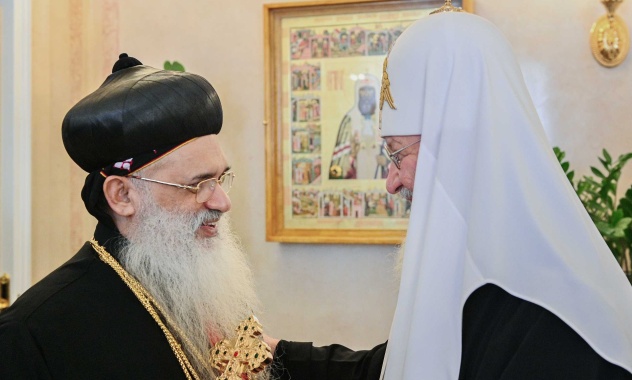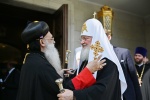Patriarch Kirill meets with Primate of Malankara Church
On September 3, 2019, His Holiness Kirill, Patriarch of Moscow and All Russia, met with the Catholicos of the East and Metropolitan of Malankara, His Holiness Baselios Mar Thoma Paulose II, at the patriarchal and synodal residence in the St. Daniel Monastery in Moscow.
Among those who accompanied the high guest were Metropolitan Zachariah Mar Nikolovos, head of the Malankara Church department for external church relations; Metropolitan Yuhanon Mar Diascoros, secretary of the Malankara Church Holy Synod; Rev. Abraham Thomas, secretary of the Malankara Church department for external church relations; and Rev. Aswin Zefrin Fernandis, head of the Malankara Catholicos’s protocol service; Rev. Jiss Jonson, personal secretary to His Holiness the Catholicos; Mr. Jacob Mathew, member of the Malankara Church Council; Mr. Kevin George Koshi, head of the communication service of the Malankara Church department for external church relations; and Dr Cherian Eapen, a representative of the Malankara diaspora in Russia.
Taking part in the meeting from the Russian Orthodox Church were Metropolitan Hilarion, head of the Moscow Patriarchate department for external church relations (DECR); Bishop Dionisy of Voskresensk, deputy chancellor of the Moscow Patriarchate; Archimandrite Philaret (Bulekov), DECR vice-chairman; Hieromonk Stephan Igumnov, DECR secretary for inter-Christian relations; and R. Akhtamkhanov, DECR secretariat for inter-Christian relations.
Patriarch Kirill warmly welcome Catholicos Baselios Mar Thoma Paulose II, noting that His Holiness had already been in Moscow in 1988, when he was the youngest bishop of the Malankara Church. He came for the Millennium of the Baptism of Rus’. ‘That event was really a turning point in the life of our Church’, Patriarch Kirill said, ‘With that celebration the era of persecution and oppression by the Soviet power came to an end and new opportunities opened up for us to engage ourselves in the enlightenment of our people and to bear the message of Christ in the vast lands of the then Soviet Union’. The Russian Church has very much changed, in particular in that 30 thousand churches have been restored and built since that time. ‘That is to say, the restoration of church life took place in the territory of the then Soviet Union and was continued in such states as Russia, Ukraine, Kazakhstan, Moldova, Azerbaijan, and the republics of Central Asia and the Baltics’.
His Holiness also noted that people in Russia regarded India with special interest from of old. ‘There were reckless people who went to India by foot and then came back to Russia to tell their countrymen stories about the fairy-tale countries they had visited. Of course, for many it was a revelation that in India there was a very strong Christian community and that this community did not emerge as a result of some western mission but existed since the very beginning of Christianity, since the apostolic times. This community was founded by St. Thomas. So there have always been mutual interest and mutual desire to have closer relations’, he said.
In 1851, he added, Indian Christians attempted to establish relations with the Russian Orthodox Church, but the wars waged at that time prevented this initiative from developing.
In 1931, His Holiness said, our compatriot, Hieromonk Andronik (Yeldinsky) came to Kerala in India and stayed there for eighteen years. We know that his names has been preserved in the memory of your Church together with the chapel he built. He also noted that in the years of persecution endured by the Russian Orthodox Church in the 20th century, much was done despite all the difficulties to develop relations between the Moscow Patriarchate and the Malankara Church. ‘In 1961 in New Delhi, there was the 3d General Assembly of the World Council of Churches, and a delegation of the Russian Orthodox Church – led by our outstanding hierarch and my spiritual father Metropolitan Nikodim of Leningrad and Novgorod – came to India and managed to establish very good relations with your Church. His Eminence Nikodim proposed that the Russian Orthodox Church’s educational institutions offer training to representatives of the Malankara Church. We know that this initiative was implemented, perhaps not on a big scale though’, His Holiness recalled.
Patriarch Kirill also reminded his guests that in 1965, Patriarch Alexy II of eternal memory, who was the Archbishop of Tallinn and Estonia at that time, visited the Malankara Church for the Kottayam Seminary’s 150th anniversary.
‘I participated in such contacts as well, His Holiness continued, ‘In 1976 – at that time I was rector of Leningrad Theological Academy – we received as our guest your predecessor of eternal memory, Catholicos Baselios Mar Thoma Mathews I. It was the first visit of a Catholicos to our Church. And in 1977, my predecessor Patriarch Pimen of blessed memory visited India and met with Prime Minister Indira Gandhi and President F. Ahmed of India. It was another very important event in our bilateral relations. In my capacity of head of the Department for External Church Relations, I visited India in 2006 and came to Delhi, Chennai and Kerala’.
Patriarch Kirill described the work of Dr. Cherian Eapen, representative of the Malankara diaspore in Moscow, as an important factor that helps to develop the bilateral relations as he translated Loving Kindness into Malayalam, one of the languages used in India, and called the translation a historic event. His Holiness thanked Dr. Eapen, who was present at the meeting, for his tremendous work.
Catholicos Baselios Mar Thoma Paulose II, on his part, thanked Patriarch Kirill for the hospitality, stressing that ‘forty years have elapsed and now we as Primates of our Churches can at last resume the exchange of visits. Your Holiness, your love and insight have helped to make it possible. Once again, thank you for it’.
The high guest recalled his latest visit to the Russian Orthodox Church in 1988, when he, as a member of the delegation of the Malankara Church, attended the celebrations of the Millennium of the Baptism Rus’.
His Holiness the Catholicos also underscored the contribution made by Metropolitans Nikodim and Paulos Mar Gregory (Vergeze) in the inter-church relations, ‘which paved a way to official visits of the Primates of the two Churches’.
The Malankara side asked the Primate of the Russian Orthodox Church to develop cooperation in the academic sphere and help train icon-painters and church choristers for the Church of India and to share its experience of Russian monasticism. It was proposed to make reciprocal pilgrimages, to organize summer institutes and to promote the participation of scholars in carious academic conferences. To fulfil these tasks His Holiness the Catholicos proposed setting up a joint working group for coordinating the bilateral relations.
Patriarch Kirill thanked the Primate of the Malankara Church for the constructive proposals he made for the bilateral relations. He also made a proposal for developing cooperation in social service, as the work of social institutions is an important signal for the modern society. He spoke, in particular, about the work of the St. Alexis of Moscow Hospital and invited the delegation to visit it. He also referred to the active work of parishes in social, youth and education spheres, stressing that through such work people are attracted to the Church and become their active member.
His Holiness supported the proposal made by His Holiness the Catholicos to set up a working group for coordinating the bilateral relations.
In conclusion of the talk, the sides exchanged tokens of the meeting.
DECR Communication Service




















